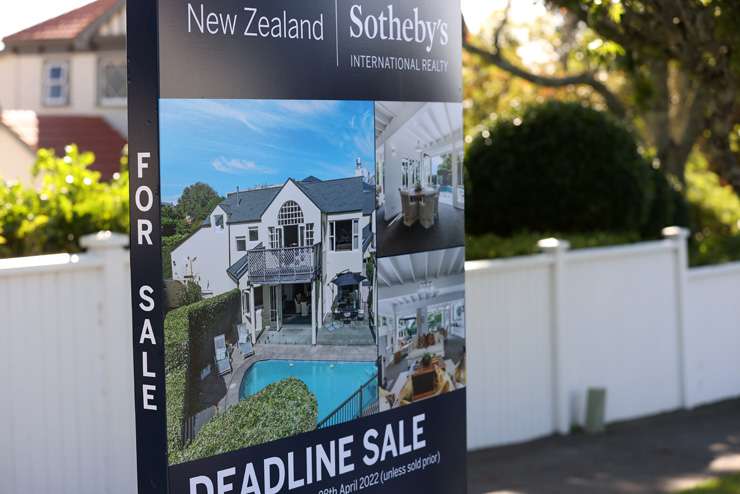Different methods of selling a property are popular in different parts of the country, and also in different economic cycles.
Auctions are suited to hot markets, whereas price by negotiation or by asking price come to the fore in a cooler market.
In Auckland, auctions have been the favoured method. They are praised for the transparency they offer – people can see who is bidding and by how much – and because the bids are unconditional so when the property sells it’s a done deal.
But with auction rooms emptier this year than during the giddy heights of the FOMO-fuelled market post-Covid there are more homes being listed as price by negotiation or with a fixed price.
Start your property search
Belinda Moffat, chief executive officer for the Real Estate Authority, says: “At the moment I think we’re really seeing a shift in use of a range of different sales methods as people adapt to this shifting market.
“In a cooling market what we do tend to see more is price by negotiation or advertised price and that’s where buyers are starting to say ‘we want some certainty so what are you asking for?’ They’ll take their time to assess the property and what they think is the fair value and price.”
Price by negotiation and by asking price are the most common selling methods in most parts of the country outside of Auckland, although not in Wellington.
In the Capital, sale by tender rules the roost. That could be because Wellington is a small town and people are private, says Nicki Cruickshank, principal for Tommy’s.
“People don’t like to have their business public, to show what they’re bidding for and all that sort of thing because it’s quite a small town, everyone knows everyone.”
Selling methods are sometimes labelled differently but they boil down to five main types.
SALE BY NEGOTIATION AND PRIVATE TREATY
These are the same thing. Here, the vendor is trying to flush out the amount people might pay.
Sale by negotiation is the most flexible method of sale, says Moffat. With no asking price, the vendor and buyer come together to negotiate on what the vendor is seeking and what the buyer is willing to pay.
North Shore Harcourts real estate agent David Ding says by negotiation means just that – but the negotiation is not limited to the price.
“Just be aware by negotiation means price, settlement date, conditions, all sorts of things.”
ASKING PRICE
A price is advertised – but this doesn’t mean that’s the end of the story.
Variations include a property being advertised as Buyer Enquiry Over a certain price, or Offers Over.
In these sales, the prices are a guide only and negotiations can continue after an offer is made – and offering the asking price does not mean the vendor has to accept the price.
Neither do they have to accept an “offer above” the asking price, be it $1 or $500,000.

A real estate sign advertises a property for sale by way of deadline sale. Photo / Fiona Goodall
Whether a vendor is interested in an offer can come down to if there are conditions or not, and also if other offers are being made.
When there are other offers, the result can be something called a “multi offer” situation, where more than one buyer makes an offer. Buyers don’t know what others are offering and the advice is to put forward your best offer.
The vendor chooses the offer they like the best, and in this situation it’s possible the buyer will end up paying more than the asking price.
When there is an asking price it can be tempting to make a “cheeky” offer and come in under the asking price, but Ding says don’t be too cheeky.
“If the price is $900,000 and you offer $450,000 that’s not really an offer.”
On the other hand, agents don’t know the vendor’s circumstances in this market and can’t make decisions for them.
“I’ve seen plenty of low offers this year – some succeed, some fail. Some vendors are pretty angry to see the low offer; some of them are still keen to negotiate.
“I guess the message for the buyer is keep trying in this market.”
A 10% gap between the offer and the asking price is more reasonable in terms of starting negotiations, he says.
AUCTION
The vendor sets a reserve price they are willing to sell at and if that price is reached at the auction the property then sells to the highest bidder.
Auctions are unconditional, which means the buyer can’t attach a string of conditions – there is no negotiation and no one can change their mind.

An auctioneer gets ready to take bids. Photo / Getty Images
The property might not reach the reserve price in which case, if there are interested buyers, the multi-offer process might be instigated.
If there is no interest, in some cases the property might return to the market and be listed for sale by negotiation or with a price.
TENDER
All interested parties are provided with all the documentation for the sale and are given the opportunity to put in their best offer by a certain date.
Offers are confidential and are all presented to the vendor at the same time. The vendor decides which to accept or to further negotiate on. No one knows what the other person has offered.
Moffat says auctions and tenders tend to be used more in hot markets because the increased competition tests what the price will be.
DEADLINE SALE
A date is set at which the property is to be sold by. Vendors can accept and negotiate on an offer at any time up to that date.
Moffat says deadline sales create a sense of competition.
“If you really like the property there’s a sense you need to get your offer in earlier.”
REINZ CEO Jen Baird says different methods are used in different areas because that’s what people know and understand – they have seen the neighbours sell that way and it works.
It’s important to be comfortable with the method when selling a house, says Baird, who adds that she would still take her property to auction even in a cooling market because of the certainty that gives the seller.
She notes many more contracts are going out in the current market with “all sorts of clauses” in them.
“Finance is obviously one, and also with the requirement for me to sell my house, so ‘I’ll sign a contract with you but I’m going to sell my house and if I don’t get what I want that whole deal falls over’.”
Ding says there are fewer cash buyers around and that many more offers are being made with conditions.

REA chief Belinda Moffat: “In a cooling market what we do tend to see more is price by negotiation or advertised price.” Photo / Supplied
He still recommends vendors to try an auction as their first method of sale, saying if there is an unconditional buyer the deal is done and they can move on with their life.
If people use sale by negotiation right from the start they might get offered a price they are happy with but two weeks later the deal falls over after the builder’s report comes in or because the would-be buyer couldn’t get finance.
But vendors are not listening at the moment, he says.
“They are firm. Two years ago they asked me ‘what should I use for method of selling’ but now they just ‘say auction doesn’t work’.”
But Ding says after the builder’s report has come in buyers are giving the vendor a list of things to fix.
“I’ve seen like a five-page list to fix. They say ‘fix that or drop me another $20k or $30k’ so usually after the builder’s report there could be another negotiation round.
“There’s all sorts of picky problems that wouldn’t be a problem last year.”
Cruickshank thinks better prices can be gained by tender than by auctions, and doesn’t favour sale by private treaty or by negotiation as they don’t create any urgency.
“They think, ‘oh, we’ll just go and have a look at it next week or the week after.’”
Moffat says the selling method chosen by a vendor can depend on the level of certainty they need.
“Are they needing to sell in a quick period of time, in which case do they want to give certainty to buyers about what the price will be?

REINZ chief Jen Baird says she’d still use auctions – even in a cooling market. Photo / Supplied
“Or, are they more interested in testing the market for what the value of their asset is, in which case do they have longer to sell, so are they prepared to seek price by negotiation and have a longer period of time.”
The REA advises people to make sure they have read and understood all the documents and methods of sale, and Moffat also says in this market people need to be sure of the price they are prepared to pay not just to buy the property but in terms of ongoing costs.
“With the risk of rising interest rates and changing rates and the cost of maintaining a property it’s really thinking about not just your payment cost but your future cost and what you can afford in the long term.”

















































































